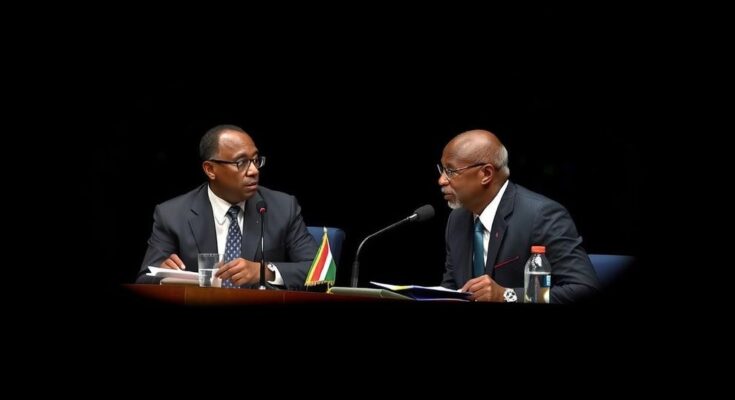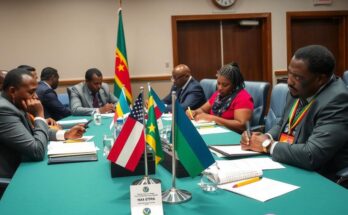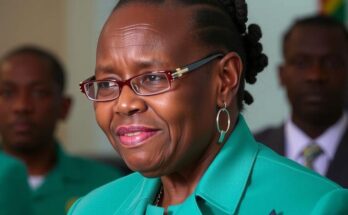President Felix Tshisekedi’s announcement of a commission to draft a new constitution for the DRC has sparked a heated debate, primarily focused on abolishing the two-term presidential limit. His move potentially opens the door for a third term in office, which has been met with fierce opposition from Kabila’s former party and various civil groups, raising concerns over political stability.
The recent declaration by President Felix Tshisekedi regarding the formation of a commission to draft a new constitution for the Democratic Republic of Congo (DRC) has ignited a significant and contentious debate across the nation. During a recent visit to Kisangani, President Tshisekedi stated, “Next year I will appoint a commission made up of people from different sectors of society to draft a new constitution that is adapted to the realities of the Democratic Republic of Congo and no longer hinders the functioning of the country.” A central focus of the proposed constitutional amendment involves the removal of the two-term limit for presidential mandates, potentially allowing Mr. Tshisekedi to seek a third term in the upcoming presidential elections. He has already served two terms, and under the current constitution, he is ineligible to run again. This controversial proposal was initially proposed by his predecessor, Joseph Kabila, in 2015 but faced significant opposition from civil society and the Catholic Church. Ironically, it is now Kabila’s own political party, which has transitioned to the opposition, that is vocalizing its dissent against the amendment. The opposition alliance, “Front commun pour le Congo” (FCC), has expressed its steadfast rejection of the proposed changes, asserting that “the constitution will not be changed.” Opposition leader Moïse Katumbi cautioned against tampering with the constitutional norms, while Donatien Nshole, Secretary General of the Congolese Episcopal Conference (CENCO), emphasized the precarious state of the country, stating, “A change to the constitution is very dangerous because it can further destabilize the country in the current situation in which it is unstable.”
The Democratic Republic of Congo has a complex political landscape characterized by a history of constitutional modifications and political tension. The current proposal for constitutional amendment arises from President Tshisekedi’s aim to navigate the political realities of the DRC while also considering his own electoral ambitions. Previous efforts to alter the constitution, particularly by Joseph Kabila, have faced substantial backlash from various sectors of society, including civil organizations and religious leaders. The renewed push for amendments now finds a divided political climate, where former allies and opponents of Kabila are similarly opposed, indicating a universally cautious stance towards potential changes which could impact the nation’s stability.
In conclusion, President Tshisekedi’s announcement of a new commission to draft a constitution has rekindled a contentious debate on presidential term limits in the DRC. With the constitution currently prohibiting his candidacy for a third term, the proposed amendment faces strong resistance from various political factions and civil society. The outcomes of this debate could significantly impact the political future of the DRC, necessitating careful consideration of the potential implications for national stability.
Original Source: www.fides.org




